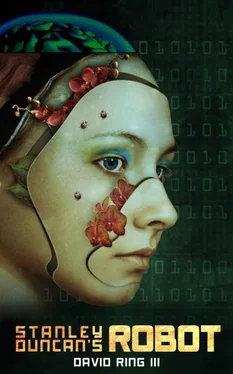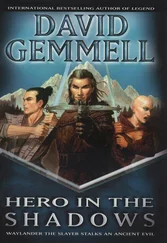“But how can we know that someone isn’t going to be messing with our minds?” asked Frank.
“Great question,” said Stanley. “Nothing is ever truly hackproof. Take that from someone who—” He looked at the inquisitive eyes of the boys and wondered how many young minds were watching him. “Er — just take my word for it.”
“But it’s unhackable,” said Sessen-less boy. “So you kinda can’t hack it, right?”
“Well,” said Stanley, playing with his hands. “Yes and no. For example, if there is a secure transmission between two parties over an unhackable line, someone need only hijack one of those parties to bypass that line’s security. There have also been rumors that the Cerebral Stitch changes the neurosynaptic organization of the brain to make it more efficient. That would mean it used some sort of additional software, which is illegal if someone didn’t know it was being installed. Such a thing could be done even if the transmissions were hackproof.”
“Scary,” said Frank. “But maybe still worth the risk.”
Dan nodded to Stanley.
“Ah, yes. So, moving on. Lab-grown cyborgs are generally what is meant when someone says ‘cyborg.’ Like a human-born cyborg, they have a Cerebral Stitch except that it is much larger and threads across the entire brain. At its core is an electronic computer, which can process and store data. It comes preconfigured with different data sets, which enable the cyborg to have certain skills, like cooking or marksmanship—”
“Or blow jobs,” said one of the boys, igniting a cacophony of laughter, howls, and praises from all three boys.
“Aren’t you a little too young to—” Stanley sighed, turning to Dan for help.
“Go on,” he said, after the tumult had settled.
“So you have the electronic computer, a Cerebral Stitch which branches out in all directions like a starfish, and a human brain that develops over it all. Altogether, this is called the dual-brain system. Like the human part of the brain, the bodies of cyborgs are created using genetically engineered tissue from humans who have responded well to the Cerebral Stitch. An adult human body is grown in a lab, and its brain forms around the large Cerebral Stitch, forming the dual-brain system, which is advanced enough to be programmed. They create an adult with no memories except those that are programmed into the dual brain. Because of that, virtual sense organs can be created that mold according to how you use it. For some, it might be photographic reading, seeing words on a page and instantly understanding them, or even more crazy, being able to download a file, like a book or a movie, and processing it immediately.”
Muffled snickers and wheezes continued to erupt, but they didn’t distract Stanley. He eyed the boys, warning them not to interrupt him. They turned red, lips and cheeks threatening to burst, but they managed to hold in their silliness.
“Then we have Dan, here,” said Stanley, squeezing him. “He is a lab-grown cyborg. I programmed him, creating a new sense organ that enables him to experience anything virtually, and encoding that as memory. So, if he wanted to learn how to play the trumpet, he could download instructions and videos on playing the trumpet, creating conceptual ideas on how to play, and then test and improve these concepts virtually. For him, it would be like waking up from a dream and knowing how to play the trumpet.”
“Interestingly enough,” said Dan, “I don’t know how to play the trumpet or any other instrument.”
“Do you want to?”
“No. Not really. It doesn’t serve any practical use for me.”
“Maybe that’ll change when you meet a girl you like,” said Stanley. “I remember writing poetry when — no, I’m not going down that tangent. Now, where was I?” He wondered how his ex-fiancée Donna was and if her husband had written poetry for her.
Dan smiled. “You were talking about how great I was.”
“Ah, yes. A big moment for Dan occurred when we were playing poker. After months of losing, he started downloading data from the internet and using it to create a new strategy. It took him a while to integrate the new data, but it was one of the first major steps that told me things were working.”
“And now Stanley can’t beat me at poker anymore,” said Dan.
“Here we go again,” said Stanley, smiling. “Okay, that’s it.”
“One more thing,” said Dan. “If anyone needs help, man or machine, please reach out to me. If I want to change the world, I have to actually start doing it.”
“Thank you, boys,” said Frank, dismissing the children.
Dan patted the sweat off Stanley’s forehead.
“How’s your following?” asked Frank.
“Skyrocketing! How’d you get them to do that?”
“I told them that if they didn’t help you, I would call their parents to complain about them coming to my store high.”
“I really appreciate that.”
“It’s a good start, but I don’t think little boys are the market we’re looking for,” said Stanley.
“Really?” said Frank. “You’re looking into the future, my friend. Who better to hear your message than children?”
Stanley shrugged.
“I’ve got one more for you. The principal of Marshfield High is a friend of mine. I have a feeling he’d love to meet you.”
“And be around all those adolescents? No, thank you.” Stanley could still hear those boys cackling in the distance — or was that in his mind?
Dan nudged him. “Come on. It’d be a great opportunity.”
Frank watched him in admiration. “That’s right. If the world knew what you have created, Stanley, they would have hope again. Imagine how many Americans you would be saving from fusing out for the rest of their life.”
“What’s so bad about fuse?” asked Dan.
“That’s a good question.” Frank looked lost in thought.
Stanley waited, but he never answered. There had been so many lives lost to fuse. He wondered who Frank had lost.
The conversation took a less-serious tone. Frank told them about himself. He’d had a fascination with robots and computers since he’d been a child. His wife, however, didn’t quite feel the same way, refusing to allow any in the house.
“They say opposites attract. Must be so,” said Frank.
“How’d you get into the supermarket business?” asked Stanley.
“The wife’s idea,” he said. “I had always wanted to be a programmer but was never any good at it. So, why beat a dead horse?”
“Why, indeed,” said Dan.
“Plus,” said Frank, “I got to be around these guys” — he motioned toward the androids — “who, believe it or not, were cutting-edge in those days. The customers loved them.”
“Was there any resentment because of the workers they displaced?” asked Dan.
“Not really,” said Frank. “This was a couple of years after the whole Texas debacle, and the Basic Guaranteed Income had already been established. I had always thought people would be happy not to work.”
Stanley nodded enthusiastically. A large corporation had test-piloted the complete replacement of workers at all of its fast-food restaurants across the state. It had completely shocked him when an angry gang of unemployed workers fought back, launching a state-wide attack against the machines that had freed them from their jobs, killing or decommissioning an entire fleet of androids. He never understood how people were so spiteful of this gift.
Dan stared at Frank. “Would you be?”
Frank struggled to come up with an answer but was saved when an elderly lady drove up to him in a scooter, demanding to be serviced by a human cashier. “Be right with you, ma’am. Please make your way down to the registers.” He nodded to Stanley. “One moment.”
Читать дальше












